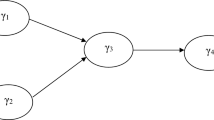Abstract
This paper presents a new algorithm estimating structural equation models by using the generalized structured component analysis (GSCA) formulation. In GSCA models, the latent variables are composites. The weights are estimated in conjunction with the other model parameters, optimizing a genuine least squares criterion. The new algorithm is designed for three subclasses often used in applications. Linear regressions are alternated for different sets of parameters according to the nonlinear manner in which the parameters are incorporated in the model. The new algorithm is compared with two existing ones by using different examples from the literature, as well as simulations. On the average the proposed algorithm produces better criterion values compared to the other two ones.





Similar content being viewed by others
References
Bayol M-P, de la Foye A, Tellier C, Tenenhaus M (2000) Use of PLS path modelling to estimate the European Consumer Satisfaction Index (ECSI) model. Stat Appl 12(3):361–375
Becker J-M, Rai A, Rigdon E (2013) Predictive validity and formative measurement in structural equation modeling: embracing practical relevance. In: Proceedings of the international conference on information systems (ICIS). URL http://scholarworks.gsu.edu/cgi/viewcontent.cgi?article=1000&context=marketing_facpub. Accessed 15 June 2016
Bergami M, Bagozzi RP (2000) Self-categorization, affective commitment and group self-esteem as distinct aspects of social identity in the organization. Br J Soc Psychol 39:555–577
Gefen D, Rigdon EE, Straub D (2011) An update and extension to SEM guidelines for administrative and social science research. MIS Q 35:2:iii+A7
Gudergan SP, Ringle CM, Wende S, Will A (2008) Confirmatory tetrad analysis in PLS path modeling. J Bus Res 61:1238–1249
Henseler J (2010) A comparative study on parameter recovery of three approaches to structural equation modeling: a rejoinder. SSRN eLibrary Manuscript no. 1585305
Hoaglin DC, Mosteller F, Tukey JW (1983) Understanding robust and exploratory data analysis. Wiley, Hoboken
Hwang H, Takane Y (2004) Generalized structured component analysis. Psychometrika 69:81–99
Hwang H (2011) GeSCA. http://www.sem-gesca.org/index.php. Accessed 26 Jan 2016
Jöreskog KG, Van Thillo M (1972) LISREL: a general computer program for estimating a linear structural equation system involving multiple indicators of unmeasured variables. Educational Testing Service, Princeton
Jöreskog KG, Sörbom D (1979) Advances in factor analysis and structural equation models. Abt Books, Cambridge
Lohmöller J-B (1984) LVPLS—program manual. Zentralarchiv für empirische Sozialforschung, Universität Köln
Lohmöller J-B (1989) Latent variables path modeling with partial least squares. Physica, Heidelberg
R Core Team (2015) R: a language and environment for statistical computing. R Foundation for Statistical Computing, Vienna, Austria. https://www.R-project.org/
Ringle C M, Götz O, Wetzels M, Wilson B (2009) On the use of formative measurement specifications in structural equation modeling: a Monte Carlo simulation study to compare covariance-based and partial least squares model estimation methodologies. Munich Personal RePEc Archive Paper No. 15390. http://mpra.ub.uni-muenchen.de/15390/. Accessed 1 Apr 2015
Rönkkö M (2016) matrixpls: Matrix-based partial least squares estimation. R package version 1.0.1
Schlittgen R, Ringle CM, Sarstedt M, Becker J-M (2016) Segmentation of PLS path models by iterative reweighted regressions. J Bus Res 69:4583–4592
Tenenhaus M (2008) Component-based structural equation modelling. Total Qual Manag Bus Excell 19(7–8):871–886
Wold H (1973) Nonlinear iterative partial least squares (NIPALS) modelling—some current developments. In: Krishnajah PR (ed) Multivariate analysis, vol 3. Academic, New York, pp 383–407
Wold H (1982) Models for knowledge. In: Gani J (ed) The making of statisticians. Springer, Berlin, pp 89–212
Wright S (1921) Correlation and causation. J Agric Res 20:557–585
Wright S (1934) The method of path coefficients. Ann Math Stat 5:161–215
Acknowledgements
I would like to express my sincere gratitude to two anonymous referees whose remarks and recommendations helped to improve considerably former versions of the paper.
Author information
Authors and Affiliations
Corresponding author
Rights and permissions
About this article
Cite this article
Schlittgen, R. Estimation of generalized structured component analysis models with alternating least squares. Comput Stat 33, 527–548 (2018). https://doi.org/10.1007/s00180-017-0723-5
Received:
Accepted:
Published:
Issue Date:
DOI: https://doi.org/10.1007/s00180-017-0723-5




